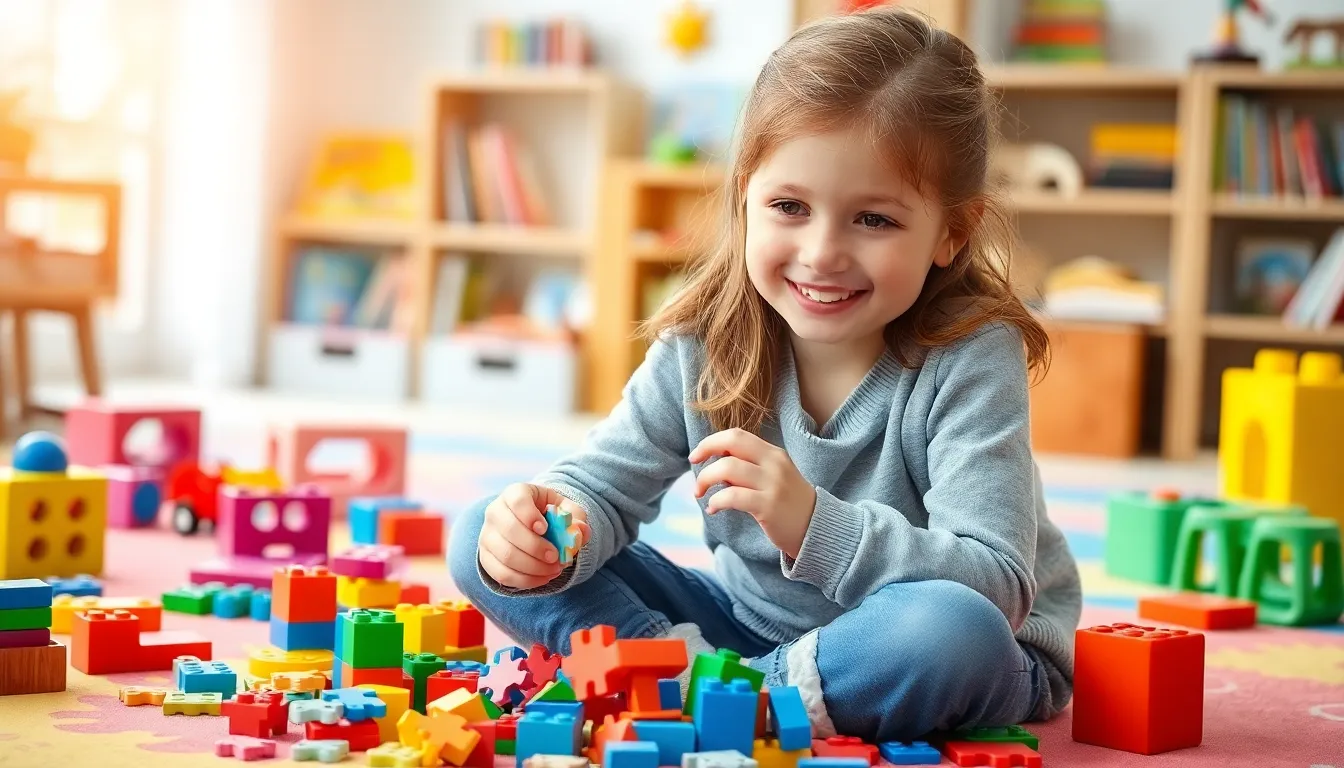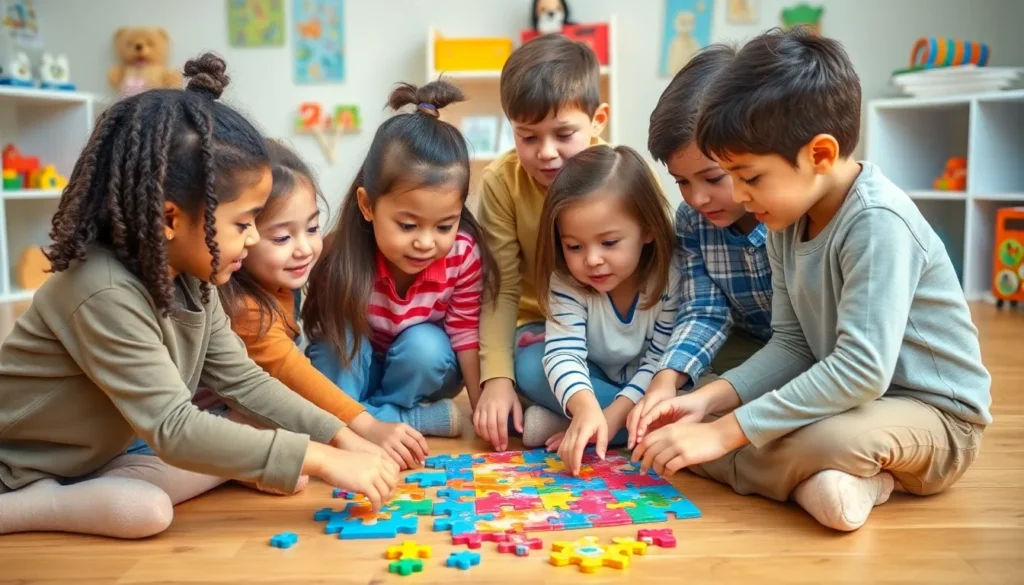Table of Contents
ToggleChildhood is a magical time filled with wonder, exploration, and the occasional tantrum over a broken crayon. But beyond the crayons and cookie crumbs lies a fascinating world of cognitive skills that shape how kids think, learn, and interact with the world. These skills are the building blocks for everything from problem-solving to social interactions, and they’re developed during those precious early years.
Overview of Childhood Cognitive Skills
Childhood cognitive skills encompass a range of mental processes that enable children to think, learn, and understand their environment. These skills include memory, attention, problem-solving, and language abilities. Development occurs primarily through interaction, exploration, and play.
During the early years, children engage in various activities that enhance cognitive development. Activities like puzzles and building blocks promote critical thinking and spatial awareness. Social interactions with peers and adults improve language skills and emotional intelligence.
Different stages of childhood showcase distinct cognitive abilities. For instance, infants focus on sensory experiences and basic motor skills. By age three, children start to use simple language and imaginative play, while those aged five to seven exhibit more complex problem-solving skills and the ability to follow directions.
Supporting cognitive skill development requires creating a stimulating environment. Opportunities for exploration, such as reading books and visiting museums, foster curiosity. Parents and educators play crucial roles by providing encouragement and guidance.
Research indicates that early intervention can significantly impact cognitive development outcomes. Children exposed to rich learning environments demonstrate greater cognitive abilities later in life. Programs focusing on early education can help bridge gaps in development, ensuring all children reach their full potential.
By understanding and promoting childhood cognitive skills, caregivers can positively influence a child’s growth. Emphasizing play-based learning, effective communication, and enriched experiences contributes to robust cognitive development and lifelong learning.
Importance of Cognitive Development

Cognitive development in childhood plays a crucial role in shaping a child’s future. Various factors during early years significantly influence this process.
Early Childhood Experiences
Early childhood experiences lay the groundwork for cognitive skills. Exposure to diverse activities enhances abilities like problem-solving and language acquisition. Engaging in interactive play, such as using building blocks and completing puzzles, stimulates critical thinking. Research shows that children benefiting from rich learning environments demonstrate improved cognitive outcomes. Positive social interactions also promote emotional intelligence, adding another layer to cognitive growth. Parents and caregivers who provide stimulation encourage curiosity and exploration, further supporting development.
Impact on Academic Success
Academic success often correlates with strong cognitive abilities. Children with robust cognitive skills perform better in school, adapting more quickly to various subjects. Research indicates that those who develop critical thinking skills early on achieve higher academic outcomes later. Engaging in activities that promote memory, attention, and reasoning sets a solid foundation for lifelong learning. Schools emphasizing cognitive development through tailored curricula contribute to improved performance in standardized assessments. Early identification of cognitive strengths and weaknesses allows for targeted interventions, leading to increased success in academic pursuits.
Types of Cognitive Skills
Childhood cognitive skills fall into various categories, each playing a crucial role in development. Understanding these types helps foster growth in young children.
Memory Skills
Memory skills enable children to retain and recall information. These skills develop significantly during the early years through playful learning. Repeating activities strengthens memory, creating pathways for information storage. For example, memorizing songs, rhymes, or simple routines bolsters recall abilities. Engaging in memory games also enhances retention, making learning enjoyable. Research confirms that strong memory skills correlate with academic success, as children who remember information easily perform better in school settings.
Problem-Solving Abilities
Problem-solving abilities allow children to evaluate and navigate challenges. These skills emerge as children explore their environment and experiment with solutions. Participating in puzzles or building activities fosters critical thinking and logical reasoning. Children learn to assess situations, consider alternatives, and make decisions. Practical experiences, such as cooking or crafting, create opportunities for real-world problem solving. Studies show that strong problem-solving abilities contribute to better academic performance and adaptability in various subjects.
Attention and Focus
Attention and focus are vital cognitive skills for learning and engagement. Children cultivate these skills through interactions and focused activities. Short, engaging tasks encourage sustained attention, helping children learn to concentrate. Activities like reading or playing board games can significantly enhance focus. It’s important to reduce distractions during these activities to optimize attention span. Research indicates that improved attention skills facilitate better comprehension and retention of information, leading to greater academic achievement.
Factors Influencing Cognitive Skills
Cognitive skills in children arise from a mix of genetic and environmental influences. Both elements significantly impact the development of these essential mental processes.
Genetic Influences
Genetics play a key role in shaping cognitive abilities. Hereditary factors can contribute to memory and problem-solving capabilities. Studies show that children with parents who exhibit strong cognitive skills often inherit similar traits. Genetic predispositions can also affect attention spans and learning styles. This connection underscores the importance of considering family backgrounds when assessing cognitive development.
Environmental Factors
Environment greatly influences cognitive skill enhancement. A stimulating home life filled with books, educational toys, and learning activities fosters better cognitive outcomes. Engaging in social interactions helps improve language abilities and emotional intelligence. Moreover, access to quality education and a supportive community creates opportunities for skill development. Children exposed to diverse experiences tend to showcase stronger problem-solving skills. Research consistently links rich environments with improved cognitive abilities, emphasizing the significance of nurturing settings.
Strategies to Enhance Cognitive Skills
Enhancing childhood cognitive skills involves targeted strategies that foster development. Two effective methods include play-based learning and parental involvement.
Play-Based Learning
Play-based learning engages children through hands-on activities, encouraging exploration and creativity. Puzzles enhance problem-solving skills, allowing children to think critically while having fun. Furthermore, interactive games stimulate memory and decision-making abilities. Blocks develop spatial awareness and cognitive flexibility as children build various structures. This type of learning also nurtures social skills, as children collaborate, negotiate roles, and resolve conflicts. Research shows that children who learn through play demonstrate stronger cognitive skills later in life.
Parental Involvement
Parental involvement significantly enhances cognitive development in children. Active participation in children’s activities fosters stronger memory and language skills. Reading together amplifies vocabulary and comprehension, while discussing daily events promotes critical thinking. Additionally, parents who engage in educational games encourage problem-solving and creativity. Providing a rich home environment with books and learning materials correlates with improved cognitive outcomes. Frequent communication between parents and educators also supports tailored learning strategies, ensuring children receive the necessary guidance for their cognitive growth.
Fostering childhood cognitive skills is vital for a child’s overall development. A stimulating environment filled with engaging activities and supportive interactions lays the groundwork for essential abilities like memory, problem-solving, and attention. Parents and educators play a crucial role in this journey by providing enriching experiences that encourage exploration and creativity.
By prioritizing cognitive skill development, caregivers can help children navigate academic challenges and enhance their social interactions. Investing time in play-based learning and maintaining open communication with educators can significantly boost a child’s cognitive growth. Ultimately, nurturing these skills during early childhood sets the stage for lifelong learning and success.







